Central Intelligence (PG-13)
27/06/16 01:21 Filed in: 2016
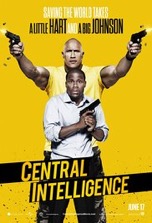
Starring: Dwayne Johnson
June 2016
The below comments (in Black) were originally tweeted in Real-time from the back row of a movie theater and appear @BackRoweReviews. Though efforts were made to tease rather than ruin this movie’s memorable lines and moments, some spoilers may exist in the following evaluation (in Red). For concerns over objectionable content, please first refer to one of the many parental movie guide websites. All ratings are based on a four star system. Happy reading!

The #GoldenJet gets upstaged by a whale.
#JunkMail Bigger is better, right?
“Black people don’t go to therapy.” Ha!
“You gained it back in muscle.” Lol
The #GoldenJet flip. #EpicFail
Nice use of printer toner in the shootout.
“You hit us!” The therapy session is hilarious. #SoulGaze
“Once a fat kid always a fat kid.” Punch him, Bob.
“The universe provides.” #GoldenJet
#SnakeGyllenhaal Ha!
“I’m the Black Badger.” Similar to “I’m Spartacus.” #Spartacus
“Bob just went commando.” Hilarious! #MicDrop
Final analysis: a humorous, though farcical, buddy movie with a positive anti-bully message.
Rating: 2 out of 4. Fans of the two stars won’t be disappointed by this oft silly story, but others...
So the latest in the long string of buddy movies is Central Intelligence, which features action star Dwayne “The Rock” Johnson and comedian Kevin Hart. Though the two become unlikely friends in high school (which we see in a prologue section), the action picks up twenty years later when “Most Likely to Succeed” Calvin Joyner (Hart) hasn’t succeeded and overweight, bully magnet Bob Stone (Johnson) is now an uber-buff CIA agent. Just go with it. Fittingly, the catalyst for the two former classmates being reunited is the occasion of their twenty year high school reunion. The plot kicks into high gear when Stone glad hands accountant Joyner into interpreting a list of offshore bank accounts in order to determine the purchaser of some secret satellite codes that, in the wrong hands, could spell doom for our planet. Clear as mud, right? Of course, most people coming to see this film aren’t expecting an Academy Award caliber screenplay; just Johnson’s patented “pec pop” (you’ll have to wait to the end credits for this) and Hart’s high-pitched, rapid-fire one-liners. Though many of the movie’s storylines and characterizations are utterly daft, there are some redeeming themes here, like: the power of friendship, the reprehensible nature of bullying and the importance of getting therapy (not the Barbershop variety). The anti-bully message has a great deal of relevance since bullying is rampant in our society, especially online and in our nation’s schools. The fact that many bullies remain unrepentant even into adulthood, as Jason Bateman’s obnoxious character illustrates, is despicable and sad. Another meaningful moment is when Stone purposely stalls the plane, forcing a bucket list confession from Joyner. It’s a decidedly ridiculous scene but it does reveal how facing our own mortality brings into sharp focus the things that matter most in life. Though I could’ve done without Stone dancing naked at the reunion, I realize that such scenes were a main draw for admirers of Johnson’s physique. The action scenes, though well choreographed, are occasionally ridiculous, like when Stone and Joyner jump out of a tall building and land on a gigantic inflatable ape…yeah right. Though addled with dunderheaded beats, the story maintains interest throughout and keeps us guessing where Stone’s loyalties lie right up until the very end. Despite the fact that this movie is a mediocre affair and an obvious rip-off of Rush Hour (1998), a sequel seems all but assured. Let’s just hope the next film has a more compelling story…this Intelligence doesn’t live up to its name.
Finding Dory (PG)
27/06/16 00:43 Filed in: 2016
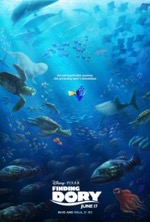
Starring: Ellen DeGeneres
June 2016
The below comments (in Black) were originally tweeted in Real-time from the back row of a movie theater and appear @BackRoweReviews. Though efforts were made to tease rather than ruin this movie’s memorable lines and moments, some spoilers may exist in the following evaluation (in Red). For concerns over objectionable content, please first refer to one of the many parental movie guide websites. All ratings are based on a four star system. Happy reading!

The animated short #Piper is equal parts cute and brilliant.
“I suffer from short term memory loss.” Admitting it is the first step.
“What if I forget you?” One minute in and I’m already tearing up.
Is that #VWBug on the ocean floor #Herbie?
#StingrayMigration Gorgeous animation. #Pixar
“Go for distance.” Hilarious!
“I’m okay with crazy.” Dory’s been there and back a few times.
“No memories no problems.” But no meaning either.
“What would Dory do?” #WWDD
“Follow the shells.” An underwater version of Follow the Yellow Brick Road.
“Your orange friends are on their way to Cleveland.” They must be #Browns.
All shells lead to home.
“You remembered.” Heartwarming scene.
“There are no walls in the ocean.” #FreeWilly moment.
“The best things happen by chance.” Dory’s guiding philosophy.
“Unforgettable.” Just like the movie.
Final analysis: just as enjoyable as the first film but for completely different reasons.
Rating: 3 out of 4. Though not as mesmerizing as the #FindingNemo, #Dory has even more heart. Superb sequel.
During the twenty-one years since Pixar released its first animated feature, Toy Story (1995), the animation studio has cranked out one hit after the next in an unparalleled feat of commercial and creative dominance. The studio’s highest grossing film (adjusted for inflation) is Finding Nemo (2003); the film was directed by Andrew Stanton and featured the voice talents of Albert Brooks and Ellen DeGeneres. That formidable team has reunited in the sequel, Finding Dory, which has been thirteen years in the making. So let’s address the nagging question in everyone’s mind: is Dory as good as Nemo? Short answer…no. In some ways such a comparison is unfair since one of the main objectives in producing the first film was to prove that underwater (the most difficult of all environments to animate) sequences could be done, and done well, with CGI. The vibrant colors, virtual encyclopedia of fish species and gorgeous photo-realistic underwater environments made for an immersive viewing experience nearly unparalleled in cinema history (Nemo stands as the finest 3D film that isn’t). Whereas, the animation in Dory is still exceptional, the palette isn’t nearly as expansive, nor does it need to be since it’s a more intimate lost-and-found tale. So where did Dory go wrong? Unfortunately, it took a page out of parent company Disney’s book and followed the formula established in last year’s Star Wars: Episode VII—The Force Awakens, a virtual rewrite of Star Wars (1977), with a dash of Empire (1980) and Jedi (1983) thrown in for good measure. Likewise, Dory is a virtual reworking of Nemo, but in reverse: clown fish Marlin (Brooks) and son Nemo (Hayden Rolence) are searching for missing Dory (DeGeneres) who, in turn, is searching for her parents Charlie (Eugene Levy) and Jenny (Diane Keaton). Many characters from Nemo appear here, like manta ray school teacher Mr. Ray (Bob Peterson) and laid back turtle Crush (Stanton), and show up in sequences that are so similar to the ones in the original film they may cause feelings of déjà vu. This sameness is this film’s Achilles’ heel and recalls the foisted, perfunctory Radiator Springs scenes in Cars 2 (2011), which, despite offering ample contextualization and that warm fuzzy feeling of nostalgia, ultimately created boredom from familiarity. Fortunately, most of Dory’s story redundancies take place early in the film. Some of the passages near the middle of the movie, like Marlin and Nemo’s various pratfalls as they make their way through the Marine Life Institute in search of Dory, are a tad pedestrian—even by animated movie standards—and just feel like filler until the movie’s two major reunions take place. But all is not lost as there are many things that recommend this film as a worthy follow-up to Nemo. Many of the new characters are welcome additions to the aquatic menagerie, particularly: Hank the curmudgeonly octopus (Ed O’Neill), Destiny the myopic whale shark (Kaitlin Olson), Bailey the concussed beluga whale (Ty Burrell) and Fluke the territorial sea lion (Idris Elba). The action-packed climax, where Dory and friends must rescue Marlin and Nemo from a Cleveland-bound semi truck is uproariously funny and recalls the frenetic action in the similarly-themed airport rescue at the end of Toy Story 2 (1999). Of course, as has become standard in Pixar movies, Dory contains plenty of hard-hitting emotional scenes, which, like the opening moments of Up (2009), will have grown men (like this one) tearing up all over the theater. Indeed, has there ever been a more pathos-inducing animated character than a tiny fish with short-term memory problems alone and lost in a gigantic ocean? The scene where tiny Dory, with her cute, quavering little voice, frets over forgetting her parents is absolutely heart-rending. The implications of this scene won’t be lost on parents of special needs children or on adults grappling with memory loss in their aging parents. However, there’s an even broader message here about the nature of memories and how vital they are in shaping our identity and reality. Deep subject matter for an animated film, but this is just proof positive that Pixar films are really made for adults, with just enough action and humor to keep the kiddies interested. In the final analysis, Nemo may be the finer film, but Dory has more heart. The sequel is truly A-Dory-ble! Here’s a thought to ponder: if the next film in the series takes another thirteen years to produce, the storyline may feature Nemo and Dory searching for Nemo’s dementia-stricken father in Finding Marlin. Poor taste since I’m writing this review on Father’s Day?
X-Men: Apocalypse (PG-13)
18/06/16 18:39 Filed in: 2016
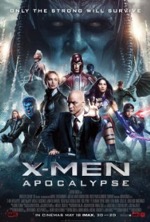
Starring: James McAvoy
May 2016
The below comments (in Black) were originally tweeted in Real-time from the back row of a movie theater and appear @BackRoweReviews. Though efforts were made to tease rather than ruin this movie’s memorable lines and moments, some spoilers may exist in the following evaluation (in Red). For concerns over objectionable content, please first refer to one of the many parental movie guide websites. All ratings are based on a four star system. Happy reading!

“A gift is often a curse.” Like #Hulk’s superpower.
Is this #XMen or #Stargate? #AncientEgypt
Scott’s got problems with his eyes. Yeah, remember that comment about a gift being a curse? #Cyclops
Does #Magneto’s daughter have any of his powers?
#Cyclops splits #ProfessorX’s favorite tree in half. Instant enrollment.
#Magneto’s daughter recreates Hitchcock’s #TheBirds.
Thug becomes one with the wall. Amazing FX. #Apocalypse
World’s first mutant. #Apocalypse
Love the #TOS #StarTrek scene on TV. #WhoMournsForAdonais?
Mystique the Mercenary. #Mystique
Scott gets some special glasses. #RayBan
“I’m blue.” Ha! #Nightcrawler
“My name is Magneto.” Yeah! #Magneto
“The third one’s always the worst.” Very true. #Ewoks
A rare non-comedic #StanLee cameo.
Why doesn’t Scott just fry the chopper and bad guys with his laser vision? #Cyclops
“I know what everybody feels.” What a burden. #JeanGrey
After losing his family, #Magneto breaks bad.
“Weapon X is loose.” #Wolverine
#JeanGrey #MindMelds with #Wolverine. She soothes the savage beast.
Embrace your powers.
“You’re in my house now.” Amazing mental duel. #Apocalypse #ProfessorX
“Unleash your power!” #JeanGrey
#DangerRoom Yay!
Final analysis: an entertaining yarn despite its slow pacing. Some memorable moments and cameos.
Rating: 3 out of 4. The best of the new cast #XMen movies. A more cerebral superhero film. Thank the Maker!
In case anyone hasn’t noticed, we’ve had three superhero showdowns within the last three months. First was the titular title fight in Batman v Superman: Dawn of Justice (in late March) followed by Captain America and allies vs. Iron Man and his cohorts in Captain America: Civil War (in early May) and now we have the epic confrontation between Professor X (James McAvoy) and his mutant students vs. Apocalypse (Oscar Isaac) and his cadre of brainwashed fiends in X-Men: Apocalypse (in late May). The fact that all three of these heroes-fighting-heroes movies were released during an election year is telling of a country divided along ideological lines and facing its most critical challenges in its 200+ year history. This movie is a sequel to 2014’s X-Men: Days of Future Past and is the third featuring the young cast (McAvoy’s team rather than Patrick Stewart’s). The film is directed by Bryan Singer; this is his fourth time at the helm of an X-Men picture. The script by Simon Kinberg clearly caters to fans over non-initiates as the narrative is laden with references to the comic books. The story itself is quite dense, juggling multiple characters and storylines for nearly two and a half hours—twenty minutes too long for my taste. Despite being a cerebral film with much to say about the current state of humanity, the story is riddled with problems. First of all, the film is embarrassingly derivative. Besides evoking both Stargate (1994) and The Fifth Element (1997) in its “Aliens Visit Ancient Egypt” opener, it also pilfers story elements from earlier X-Men films, a la the climactic confrontation between Professor X’s initiates and Apocalypse’s minions, which is similar to the clash of mutants at the end of X-Men: The Last Stand (2006). Also, villains using Cerebro for their own nefarious purposes is nothing new either: reference X2 (2003). Magneto disrupting Earth’s magnetic poles to create mass destruction is just a larger scale cataclysm of the stadium drop in the previous film. Indeed, Apocalypse’s plan to remake the world to his design is similar to Lex Luthor’s (Kevin Spacey) dastardly plot to wipe out the Eastern seaboard by dropping a kryptonite-infused island into the Atlantic Ocean in Superman Returns (2006), an earlier Singer effort. Not all is lost here, as several topical storylines make this a worthwhile entertainment—apart from its mind-blowing action sequences. Since his design is to destroy the planet as we know it, Apocalypse is a type of terrorist leader. The scene where he rounds up the world’s nuclear arsenal and tosses it into space generates ambivalent feelings since we’d be safer without them so long as someone like Apocalypse doesn’t show up on our world. The destruction caused by the Apocalypse influenced Magneto also taps into 9-11 anxieties and the prevalent feeling (reflected in the rise of dystopian literature and media in our society) that an earth-shattering event is in our not too distant future. Ultimately, the two highest yield plot elements are Jean Grey (Sophie Turner) overcoming her fears and unleashing her mental fury—a girl power sequence that rivals Rey (Daisy Ridley) arming herself with the lightsaber and confronting Kylo Ren (Adam Driver) in Star Wars: The Force Awakens (2015)—and Magneto (Michael Fassbender) breaking bad after his family is accidentally killed. The scene where Apocalypse takes Magneto to confront his past at Auschwitz is another deeply affecting scene with some tremendous acting by Fassbender, who delivers the movie’s standout performance. This brings up an interesting question about the franchise’s decorated ensemble…how long will McAvoy, Fassbender and Jennifer Lawrence stick around since their superstar status has afforded them more attractive and challenging roles than anything Marvel could hope to offer? And for that matter, how many more X-Men films will the forty-seven year old Hugh Jackman (who briefly appears here as Weapon X) make? Even though this is the finest of the new X-Men films, it still doesn’t approach the quality of the first two films in the series. Still, compared to the typical comic book film, the X-Men films are like Shakespeare by comparison. Oh, and on a side note, the next film will be the tenth in the franchise. And you know what the Roman numeral for ten is.
Alice Through the Looking Glass (PG-13)
06/06/16 00:23 Filed in: 2016
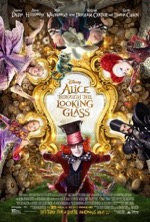
Starring: Mia Wasikowska
May 2016
The below comments (in Black) were originally tweeted in Real-time from the back row of a movie theater and appear @BackRoweReviews. Though efforts were made to tease rather than ruin this movie’s memorable lines and moments, some spoilers may exist in the following evaluation (in Red). For concerns over objectionable content, please first refer to one of the many parental movie guide websites. All ratings are based on a four star system. Happy reading!

Wait a minute, is this the Alice sequel or the next #PiratesOfTheCaribbean movie?
“Time is a thief...and a villain.” #CaptainAlice
Wow, that’s quite a dress...looks like a butterfly threw up all over it.
Do six impossible things before breakfast. Alice is quite the overachiever.
The Matter of the Hatter. Subtitle.
The Hatter throws Alice out of his house. #DarkMatterHatter
#Unpossible. Similar to an #Unbirthday I guess.
“I am time.” Nice stache.
Time to go further #BackInTime.
“Hatting is a serious business.” #MadHatter
The #RedQueen kisses the #Jabberwocky’s leg. Ick!
A big kiss for the little Hatters.
The de-rusting FX are top-notch.
Final analysis: a mediocre follow-up to the uninspired original. Lacks Burton’s direction and Carroll’s vision.
Rating: 2 out of 4. Some decent creativity, but the plot falls down a rabbit hole into a rote, ridiculous realm.
This return to Wonderland, entitled Alice Through the Looking Glass, has all the regulars back from the first film—Mia Wasikowska as Alice, Johnny Depp as the Mad Hatter, Helena Bonham Carter as the Red Queen, Anne Hathaway as her sister the White Queen, the late Alan Rickman as the blue butterfly Absolem, Stephen Fry as the Cheshire Cat, Matt Lucas as Tweedledee and Tweedledum—along with some notable newcomers like Sacha Baron Cohen as Time, Rhys Ifans as Zanik Hightopp and Hobbit alum Richard Armitage as King Oleron. The conspicuous name missing from the movie’s headliners is director Tim Burton, who merely serves as a producer on this film. The director this time around is James Bobin (Muppets Most Wanted, 2014), and while it’s clear that the creativity doesn’t suffer from the change at the helm, the wit and whimsy so evident in many of Burton’s films is largely missing in Bobin’s trip to Wonderland. If you’re expecting this movie to closely follow Lewis Carroll’s book of the same name (technically Through the Looking-Glass and What Alice Found There), you’ll be sorely disappointed. Just as the first film, Alice in Wonderland (2010), mashed up story elements from Carroll’s works, so too does the sequel. A prime example of this book-to-movie aberration is the Jabberwocky, which made its first appearance in the second Alice book but was introduced during the climactic confrontation in the first film. This brand of fairy tale pastiche, which serves as the movie’s narrative, blends original elements from the source material with made-up events, characters and situations in order to flesh out the plot and provide enough story sinew to hold together the many action sequences. The resultant tale is an uneven, tenuous and convoluted mess that has Alice jumping backwards and forwards through time, like a Victorian Sam Beckett, attempting to remedy events that threaten to destroy time itself…literally. The main plot points here are the search for the Mad Hatter’s family and the reconciliation between royal sisters, the Red and White Queens, and, as would be expected, both storylines are resolved with a cloying display of sentimentality. As for the movie’s creative elements, the Chronosphere is a nifty time travel apparatus but is just a fancier version of the titular time machine in H. G. Wells’ sci-fi classic. The expansive rooms containing the massive cogs that keep time running are appropriately gigantic, but are reminiscent of colossal clockwork structures in dozens of movies ranging from The Great Mouse Detective (1986) to Shanghai Knights (2003). Though the hodgepodge assemblages of spare parts that serve as Time’s assistants are clever contraptions, they certainly aren’t original (perhaps you remember the metallic sidekick Tik-Tok in Disney’s Return to Oz (1985) or the eponymous robot in Hugo (2011), which, incidentally, also co-stars Baron Cohen). These kinds of expedient, cut and paste production elements are the very epitome of what makes this film such a waste of talent and resources…it’s derivative and hollow (like so many other summer tentpole pictures). If there’s a silver lining here it’s that Depp’s creepy, walleyed Hatter is only in about half of the film and isn’t nearly as obnoxious as he was in the first film. Well, there you have it…Looking Glass is a mediocre sequel to an uninspired original. I’ve done my best to dissuade you from stepping through the movie’s magic mirror which will rob you of your hard-earned cash and extract two hours from your life that you’ll never get back.
Money Monster (R)
05/06/16 16:29 Filed in: 2016
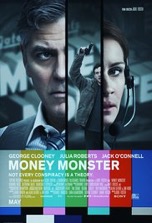
Starring: George Clooney
May 2016
The below comments (in Black) were originally tweeted in Real-time from the back row of a movie theater and appear @BackRoweReviews. Though efforts were made to tease rather than ruin this movie’s memorable lines and moments, some spoilers may exist in the following evaluation (in Red). For concerns over objectionable content, please first refer to one of the many parental movie guide websites. All ratings are based on a four star system. Happy reading!

“You don’t have a clue where your money is.” Scary reality.
“Glitch.” Is it possible this movie is unintentionally timely, i.e. the edited #Iran video?
#ErectileCream on a news set. #Random
“We don’t do journalism period.” Does anyone anymore?
#LeeGates has some decent dance moves.
Most lax security on a set ever. #Nitpick
“It’s all rigged.” Not exactly a news flash.
“Start hosting.” Way to turn the tables.
Shoot the star of a news show live on TV? Shades of #Network.
Buy #IBS, save a life. #TripleBuy
“You believe in money, not people.” #ShallowExistence
Who needs enemies with a girlfriend like that?
“It’s not the computer’s fault.” Sure, buddy.
“We have an 80% chance of an 80% chance.” Hilarious!
Talk with the weapons up. Negotiation at gunpoint.
“What’s wrong with making a profit?” Plenty if people are made to suffer for it.
Final analysis: a message film wrapped in a thriller built on a farce. Entertaining but not earth-shattering.
Rating: 2 1/2 out 4. Nice to see Clooney and Roberts together again even though they only share one scene.
If money is the root of all evil, Lee Gates (George Clooney), a Jim Cramer style stock tip show host, is desperately wicked. As the movie opens, Gates and his producer, Patty Fenn (Julia Roberts), are engaging in some good-natured banter as they prep for another episode. But as filming commences, an unexpected visitor drifts onto the set and sends the plot veering in a different, unexpected, and ultimately, less interesting direction. It’s rare that such scintillating stars (Clooney and Roberts in front of the camera and Jodie Foster behind it) should be attached to such a banal, lackluster film. What starts off as a compelling The Newsroom style TV studio drama rapidly morphs into a high stakes thriller with Gates doing his finest fast-talking to avoid being blown to bits by a suicide vest on national television (a knowing riff on Sidney Lumet’s prescient 1976 film, Network). The movie’s tonal shift is jarring and really detracts from what sets up as a dramatic edutainment centered on the turbulent world of finance. This bait-and-switch narrative choice may annoy or confuse some audience members since the genre at the beginning of the film isn’t the same as when it ends. Sadly, the more the thriller storyline progresses, the daffier the movie becomes and the more we don’t care who comes out alive…or who doesn’t. It’s a shame that such tremendous talent was squandered on such mediocre material and that the movie’s intriguing premise, which contains a salient message about the current state of our economy and its effect on the scores of struggling citizens in our society, is thrown away in favor of the kind of remedial fare you can find on any run-of-the-mill TV procedural. So what did the actors see in this script that made them want to sign up? Maybe it had nothing to do with the script and everything to do with Clooney and Roberts jumping at another chance to perform together (this is their fourth big screen collaboration). Or maybe their decision was simply based on a desire to work with Foster. Perhaps I’ve got it all wrong and their true motivation for making this movie wasn’t camaraderie or artistic integrity…just the money.